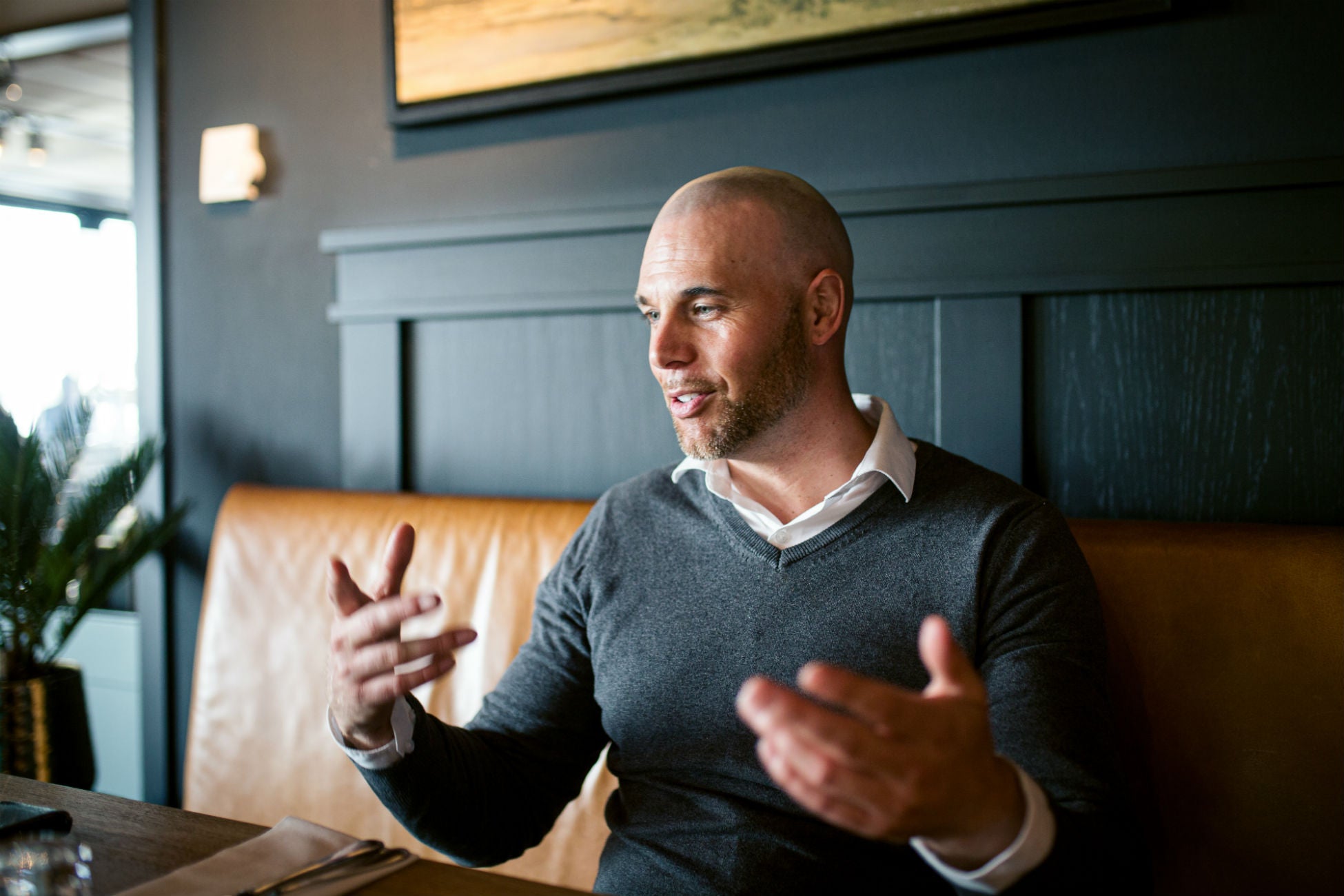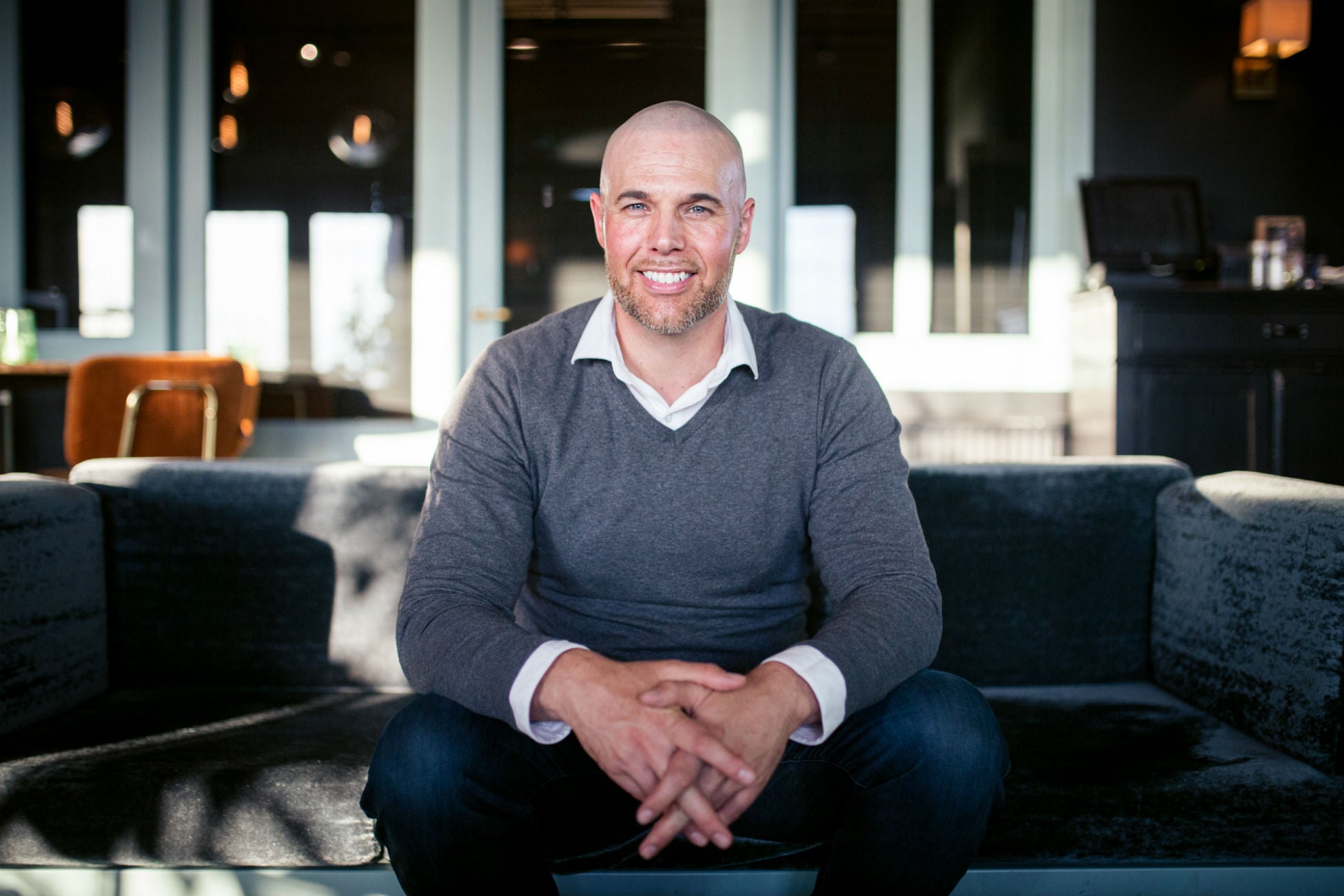Joram van Klaveren (40) spent several years as the ‘Islam spokesperson’ for the far-right Freedom Party. Now he is a Muslim himself, and he has written the book ‘Afvallige’ (Apostate) about his experiences. Together with VU Magazine, he looks back on an eventful year, his career with the Freedom Party, and studying Religious Studies at the VU Amsterdam.
The Muslim and former Freedom Party member has invited us to an idyllic restaurant in his home town of Almere, with a scenic view of the Noorderplassen lake. “Not bad for Almere, right?”, he asks with a smile. The restaurant is just around the corner from the mosque that he visits regularly.
You’ve recently celebrated Ramadan for the first time. How did it go?
“Better than expected. The mild weather made it easier. I was pretty thirsty, but you get used to that. Sometimes I’d celebrate Iftar with other Muslims. It was a special experience to be able to eat together with them and talk about our faith. At home, we didn’t do anything out of the ordinary, other than the fact that I’d eat my cauliflower a bit later than my wife and kids.”
You’ve had an exceptionally eventful year. Was it a difficult experience?
“In some aspects, it was. Many people close to me weren’t happy about it. My mother thought it was especially difficult. Naturally, I don’t want to cause the people I love any pain, but that’s what I did. It wasn’t always easy, but I understand how they feel. It’s a big step for a lot of people, especially for the outside world. Some people think that I rolled straight from Geert Wilders’ lap to the mosque, but it was actually a process that was five years in the making. To me, it didn’t feel like a sudden change.”
Are you a different person since your conversion?
“It’s made me happier as a person. The things I had in my head when I was still Christian never really corresponded to what was in my heart. But that’s the case now, and that gives me a sense of peace. My wife says that I’m calmer now, and nicer.”
“It’s not as if I’m walking around wearing a turban now.”
What are some concrete ways your life has changed?
“I pray differently, I’m learning Arabic, and I go to the mosque. I also approach religious issues from a different perspective. But to the outside world, not much has changed. It’s not as if I’m walking around wearing a turban now.”
Are you irritated by the fact that people expect you to defend your change of religion?
“I don’t think that’s strange at all. I spent years as an avid opponent of Islam. In the public debate, opinions about Islam are extremely polarised, and I’m one of the people who helped contribute to that, so I think it’s only logical that as a public figure I should explain my decision.”
Do you find it difficult that some people don’t take it very seriously?
“It’s to be expected. If the Prime Minister does something unusual, comedians will make a sketch out of it. My conversion is something noteworthy, so naturally it’s also the subject of criticism, jokes, anger, or debate. I mean, in Western Europe it’s become strange to have any kind of religion at all. As a result of secularisation, it’s no longer an integral part of daily life. A person who’s an active practitioner of a religion is quickly seen as a bit off. And then if you confess to being a Muslim on top of that, a lot of people think it’s totally weird.”

Were you afraid to ‘come out of the closet’?
“When I joined the Freedom Party, the people close to me also weren’t too happy about it. So I had already endured a lot of criticism. But in the end, it wasn’t all that bad, except for the hate and threats via e-mail and social media. In fact, the opposite was a lot more common: many Muslims had really positive reactions.”
Do you sometimes feel like you owe them something?
“Of course. I’ve done things that hurt them, and that’s not nice. In several television programmes, people have demanded some kind of mea culpa, but I think that’s nonsense. Any apologies have to come from within, and I’ve offered several at moments of my own choosing. I’ve also set up an organisation, called the Anthony Janszoon Association. Through lectures and other activities, I try to correct the image that I’ve had a hand in creating.”
You began your studies in Religious Studies and Philosophy on 11 September 2001 (9/11). Did your studies contribute to your earlier convictions about Islam?
“I still remember my mother asking why I couldn’t enrol in a normal study programme, like Law or Economics, and not something ‘irrelevant’ like this programme. But sadly enough, the attacks actually made this study programme more relevant. Rather than studying theology, we examined the phenomenon of religion from an academic perspective. The emphasis wasn’t on the religious search for truth, and the search for truth in Islam didn’t play a different role than that in Christianity. Naturally, the VU Amsterdam has a Christian tradition, so there was relatively more attention paid to Christianity than to other traditions.”
“Only once my Reformed truth faded away, was I able to look at it with a new perspective.”
In your book, you wrote that you only came across the ‘real sources’ while you were writing. Why didn’t that happen during your studies?
“My vision of the world was based on my orthodox Protestant upbringing. I was fairly reserved towards other religions, and that could have been a source of my antipathy to Islam. Only once my Reformed truth faded away, was I able to look at it with a new perspective, and I came across certain sources that had been presented as ‘indisputable’ at the VU. Then I went looking for where those sources came from. That’s how I learned that a famous story from the Islam-critical corner about 900 Jews slaughtered by Muhammad isn’t actually backed up by original sources.”
Do you understand why people think you should have looked at those sources earlier, in your capacity as a former Islam spokesperson?
“The foundation for your world view is largely shaped by your upbringing. You then carry it along with you during your studies. So I went looking for confirmation of that truth, and that continued through to my political career. I didn’t think that I was wrong at the time, so I didn’t feel the urge to evaluate my convictions. In retrospect, it is indeed the responsibility of a spokesperson to get to the bottom of an issue, especially if you voice such strong opinions. But at the time, I was 100% convinced, and any other view was immediately dismissed.”
“Someone sent a mail telling me that he wanted to hang me from a rope.”
What important lessons have you gained from your experiences?
“Don’t just read things you already believe. With the rise of the Internet, it’s all too easy to get caught up entirely within your own little bubble. What you see is only a tiny part of a much larger picture. Many people have constructed their entire world based on social media like YouTube and Facebook. But if you stop on the street and actually talk to a girl with a headscarf or a boy with a beard, you’ll soon see that we aren’t really all that different.”
What is the most important lesson of Islam for you?
“The Koran explicitly states that if someone does something bad, you should do something good in return. So if someone insults you, you should still treat them in a friendly manner anyway. I try to do that. Over the past few months, I’ve received the occasional death threats on social media and via e-mail. For example, someone sent a mail telling me that he wanted to hang me from a rope. So I replied asking what it was that bothered him so much, and we started exchanging e-mails. We didn’t end up seeing entirely eye-to-eye, but he did acknowledge that his initial reaction was incorrect and embarrassing, and it turned out to be a surprisingly peaceful conversation.”









